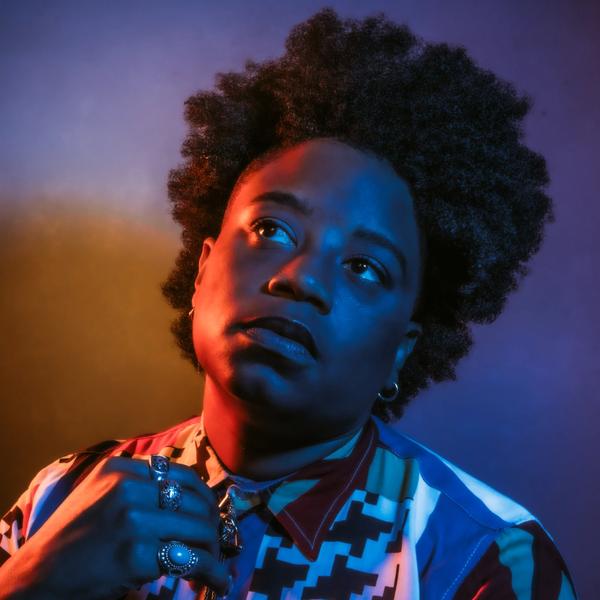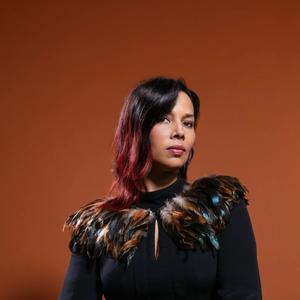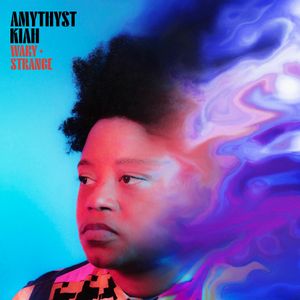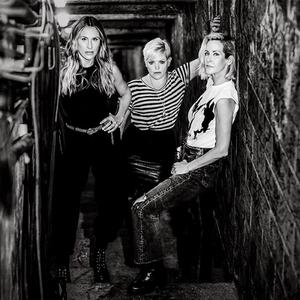




Link copied

Amythyst Kiah's voice is powerful. It booms out, filling every corner of every room she enters with its warmth, wit, and wisdom. It's the kind of voice that cuts into your core even while wrapping around your heart. You feel it from both the outside-in and the inside-out with every cell of your being. And then she starts singing.
Growing up in Tennessee, a target of othering and ostracism largely due to her race and sexuality, Amythyst took refuge in music. There, she found the hope of belonging and, eventually, the healing of trauma, though not without a detour into denial which manifested, most prominently, in the abuse of alcohol.
These days, though, Amythyst is happy and healthy; personally fulfilled by a loving relationship and a passel of friends, and creatively fulfilled with a Grammy nomination and a new release on Rounder Records, alongside tour dates with Brandi Carlile and Jason Isbell.
All of this is much like her powerful voice because, really, she's only just getting going.

The new album, Wary + Strange, has been a long time coming. Does it feel a little bit like your debut, even though you already have a couple of records out?
This is definitely my label debut because my past records have been self-released. From a creative and personal perspective, it's a little bit of a rebirth for me; I spent a significant amount of time reinterpreting traditional music while also still dealing with the past trauma of my mother's suicide. So, my coping mechanism was to disassociate from my feelings, keep people at a little bit of a distance and not get too close because I had this fear of being rejected or abandoned.
So, all of that was happening at the same time. On this record, some of the songs that I’d already written and some of the newer ones all tie back to me dealing with the trauma. So I think, for the first time, this is me really telling my story and facing my saboteur head on.
You made this record, what, three times?
Third time's the charm.
For sure, eventually letting Tony Berg produce it. Did that feel like a bold choice to make - both picking him AND starting over again?
From a creative standpoint, going with him made complete sense because of what I wanted to do sonically. I wanted to combine alternative music and roots and he was perfect for that job. People that have been listening to me for a long, long time will definitely see this as a bold move. But for me, this is a natural transition. Of course, I was always going to want to do this because I've always loved this experimental and sonically strange stuff.
What was the most terrifying was the fact that I was going to have to disassemble everything from the previous two times I went into the studio. What softened the blow is that I had that sweet, sweet label money to help out for this third time. The past few times I went into the studio to make a record, it was like, “OK, I've got this amount of money.” So every time I went in, I was always thinking about how I have to hurry up because I only have X amount of money. That really takes away from the creative process because then it feels like you're limited in what you can do or what you can think about, like bringing in other players, bringing in other instruments, whatever the case may be.
The album includes a new version of 'Black Myself' which got a Grammy nomination for Best American Roots Song and won the Folk Alliance award for Song of the Year. Now, it's getting a whole new life as a rock anthem. It just slays me that a song about the legacy of slavery and white supremacy would be so popular, but there it is. Why was it important to you to reframe it in this edgier setting?
It really embodies a Southern rock song - I was always going to need to go back in and do a Southern rock version. Tony was like, “Well, why don't we put it on this record?” At this point, the George Floyd murder happened, and the Breonna Taylor murder had happened, and it just made sense to keep this song, reimagine it and put it on this record.
It's also a perfect bridge from Our Native Daughters and the people who know you. So you can hold it up and say, “It's still me.”
Exactly. It’s connecting all of that and then continuing to be part of the conversation - because it's been remarkable to see the mainstream discussion continuing to happen. Usually what would happen is, an unarmed person of color would be murdered by police and people would be mad for a couple of weeks and then we'd all go back to normal. But there's been this sustained discussion happening, so this was just my way of continuing it in a different way.
One of the album's other centerpieces is ‘Wild Turkey’. It's absolutely devastating in every way. It’s such a gift to anyone who might be going through a similar trauma of losing someone to suicide. As necessary as it was for you to write, how difficult is it to then share something that deeply personal, even knowing how much music helped you as a kid?
It took me two years to write that song, so I was able to slowly get used to the idea of performing it. That transition was very slow. It was mostly because I wanted to get it right - whatever that meant. I tried different styles, different chord progressions, different melodies, things just weren't clicking. My initial attempt was to try to make it an anthem of a song, but while singing these really sad lyrics. I like the idea of that juxtaposition, but it didn't really work. So I thought “You know what? Just make this sad as hell. Let's just lean into how sad it is, you know?” Once I took that direction, I said “OK, the song's done”.
Since 2016, I've been going to therapy, unpacking all of these mental things that have been going on with me in regards to my mom's death and the way that I've been moving through the world, which was very much within self-preservation survival mode. So, this record is where I am now - it's five years in the making, getting to this point.
It's like your five-year chip in a way - a marker of your progress to this moment.
Exactly. I also learnt along the way that grieving isn't linear. I'm at a point now, when I'm singing this song, that I'm able to do it and it's a bit easier to perform than it was when I first finished it.
You do that work with each and every song. Grief. Trauma. Hope. Healing. It's all in there. You look at a time in your life when you drank too much. You take on the inevitable othering you have endured. You see your music as much more than your day job, don't you? You clearly feel and honor the responsibility that comes with having any kind of platform.
Music has always been about healing and finding a place to belong when I sometimes didn't. That's just always been my main M.O. when it comes to music. Music was always a very personal thing, so moving from it being personal to performative, that was definitely something to get used to. I feel like I've been doing all right, all things considered.
Music was my insulator - it was the thing that protected me. The more that I performed, started singing my own songs instead of the traditional ones and saw people coming up to me and telling me about what a certain song meant to them, I thought, “This is exactly how I felt when I listened to Tori Amos or Nina Simone. These are the very things that I felt”. It just kind of clicked then that I'm part of this bigger story. It's not just me fighting with my feelings and thoughts. I'm part of something else and I'm not the only one. Now, I can look at this as sharing as opposed to being alone in it, I guess. I've learned a lot about myself with this whole process.
Along those lines, I love that you share photos from your workouts and from your relationship. It's a small thing, but it's a symbolic gesture that says, “See? Healing is possible. Happiness is possible”. That may not be your intention, but it definitely has that effect.
I mean that. That thought definitely goes into that. I think what's interesting is that I've made it a point to try and be very mindful about how often I use social media and what I do post so that I'm not oversharing - there's a lot of people that do and it works for them. They get a lot of paid sponsorships for oversharing; I don't see anything wrong with that. For me though, personally, the time in my life when I was oversharing and posting a lot is when I was in a lot of pain. So, I associate posting on social media with me not being fulfilled. I'm not saying that that's the same for everybody else who does that, but it's just the way that I respond to it.
I walked into social media with a not healthy mindset, I have to make sure that I keep a little bit of a distance. So, while I like posting things, I'm also very, very mindful about how often and how much I'm on there, because the whole the machine is set up to get you addicted to your phone. So it's having to combat that - I feel like my mental health is a lot better for it.
But when I do post personal things, I want it to come from a place of “I'm having this wonderful moment with this person”.
“Look at how much I lifted.”
Yeah. There's another thing to that, and this is almost a different topic, but I've been reading a lot about parasocial relationships - where a person is a fan of a celebrity or whatever and some people create a relationship in their head with the person who doesn't even know they exist, more than likely. What I've noticed is the people that share the most, if they suddenly say or do something that maybe is perceived as not being awesome, then everybody's on the attack - because they feel like that's their best friend and their best friend has betrayed them.
While I love and appreciate people listening to my music and being inspired by what I do, I also don't want to create an environment where people feel like I'm their best friend!
I think, for a lot of people it works and nothing necessarily bad really happens. But, for me, it would just be too much. I'm more of an introverted person anyway so, mentally, it's just a little too much pressure. I want to have a healthy relationship with my fans and have my own mental health preserved. I think it's possible to do both.
Amythyst Kiah's latest album, Wary + Strange, is out now via Rounder Records. Listen to the standout song 'Firewater' below.





